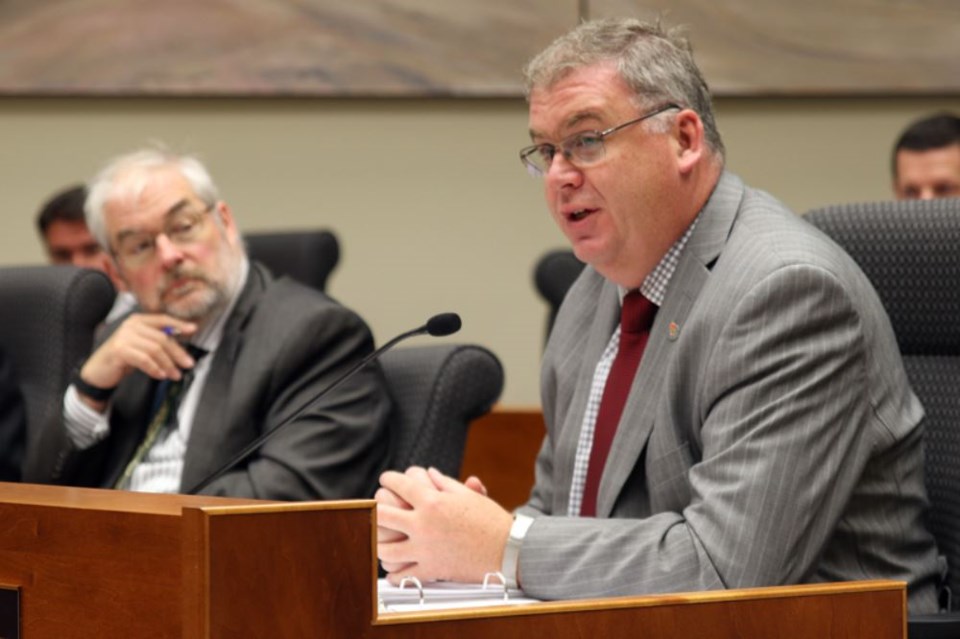THUNDER BAY – The city’s projected operating deficit has increased four-fold between the first and second quarters of this budget year.
At its Monday meeting, administration presented city council a $3.2-million negative variance, as of June 30. Its April report showed a $768,000 deficit projection by year’s end.
The second quarter spending figure amounts to 1.4 per cent overage on the $235-million 2016-2017 municipal budget.
Administration’s report attributes excess spending to external legal fees, insurance costs and the Thunder Bay Police Service’s budget.
In response, City Manager Norm Gale committed to deferring hiring for vacant positions, reviewing non-essential capital projects and either deferring or eliminating non-essential travel and discretionary spending in all city departments.
Gale referred to those as “short-term approaches” but in the long term, he said administration intends to present “appropriate budget levels” to ensure the city can adapt to rising costs.
“There are costs associated with some of those services that are uncontrollable,” he said.
“These are demand issues and what administration needs to do is ensure the budget meets the demand.”
Gale’s report indicates insurance costs are running $2.1 million over budget due to “a number of large claims and expected settlements.” Legal fees are expected to exceed their budget allocation by $1.6 million to “address litigation commenced against the city.”
A million additional dollars in spending is projected in the city’s police department.
Thunder Bay Police Chief J.P. Levesque compared this year’s anticipated overtime costs for his officers to the $700,000 budget excess in 2014, a year in which the department faced 11 homicide investigations.
 “I said to council, ‘if you don’t do things properly, it’s going to come back and cost you even more money,’” Levesque said.
“I said to council, ‘if you don’t do things properly, it’s going to come back and cost you even more money,’” Levesque said.
“If it’s your 11-year-old child missing, do you not want a full ground search with a tactical unit to find that individual? Things like that get expensive. We’ve had 67 major occurrences within a six-month period. It’s an amazing number and it’s a costly number.”
Coun. Brian McKinnon occupies council’s seat on the Thunder Bay Police Services Board. He pointed out council directed the police to cut 4.5 per cent of its budget last year as he painted a bleak picture of local police resources including outdated protective vests, ineffective radio communication, and insufficient office space.
McKinnon also tied policing costs and legal costs together as he invoked the Ontario Independent Police Review Director’s office, which investigated 27 complaints citizens brought against Thunder Bay officers in 2014-2015 alone.
“The police are under constant surveillance,” he said.
“The watchdog OIPRD, which is, if someone has a complaint that they’re arrested too severely or something happens so that goes through the OIPRD -- that all costs money. We have to hire a lawyer. We have to get things resolved.
"Ninety per cent of them get resolved right off the bat but every one of those things costs money and the police are easy targets.”
The variance report also showed city-owned golf courses are running between $180,000 and $220,000 in the red due to wet weather.
Coun. Joe Virdiramo was among several councilors who gave impassioned speeches regarding municipal priorities and urging departments to live within their allotted budgets.
He urged his colleagues to question senior levels of government when new regulations are implemented to ensure funding is attached.
The alternative, he pointed out, is resulting in higher taxes.
“The homeowner can’t afford any more. People tell me from time to time, ‘you’re taxing me right out of my own home’ – and in some cases, that’s true – and I feel for those people,” Virdiramo said.
